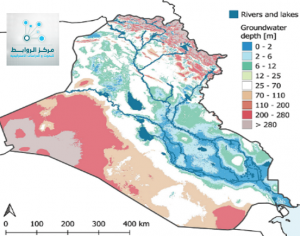By: Shatha Kalel
Iraq is facing a significant challenge in managing its transboundary aquifers. These shared groundwater resources require both scientific and practical strategies to prevent rapid depletion and maintain water quality. Disparate management practices on either side of the border exacerbate the issue, making coordinated oversight essential.
Groundwater Depletion and Quality Concerns
As groundwater depletion accelerates, the impact will be felt most acutely in regions where these resources are shared. Compounding the problem is the declining quality of groundwater, driven by rapid urban expansion, unregulated industrial activities—particularly in the oil sector—and inadequate agricultural practices. This deterioration poses a significant threat to the long-term sustainability of groundwater supplies and their associated benefits.
The Tragedy of the Commons
The excessive exploitation of identified groundwater sources exemplifies the “tragedy of the commons.” Landowners often treat groundwater as their private property, neglecting its communal nature and the necessity of state-regulated management to preserve this vital resource. This mismanagement disrupts the dynamic balance of aquifers, jeopardizing their sustainability and disproportionately affecting vulnerable populations.
Comprehensive Management and Monitoring
To address these issues, the Iraqi government and society must deepen their understanding of the benefits and costs associated with groundwater usage. A comprehensive and continuously updated record-keeping system for well operations is essential. Monitoring groundwater levels—fixed, static, and dynamic—is crucial for developing effective well operation policies. Incentives should be provided to those who maintain thorough records of their wells, ensuring sustainable resource management.
Policy Development and Sectoral Action
With detailed data on groundwater conditions, policymakers can craft successful strategies to align the costs of investment with the social opportunities of groundwater usage. Understanding the geological formations that house groundwater is essential for determining the extraction quantities needed and informing policy decisions. These insights can help balance the needs of different users, from those with underutilized resources to those suffering from overexploitation.
Economic Analysis
1. Groundwater as a Common-Pool Resource
Economic Implication: Groundwater is a common-pool resource susceptible to overuse and depletion if not properly managed. The “tragedy of the commons” illustrates the economic inefficiencies and potential for resource collapse when individual users act independently according to their self-interest.
2. Cost of Depletion and Quality Deterioration
Economic Costs: Groundwater depletion and quality deterioration lead to significant economic costs, including reduced agricultural productivity, increased health care costs due to contaminated water, and higher costs for alternative water sources.
Social Impact: These economic costs disproportionately affect vulnerable populations, exacerbating social inequalities.
3. Regulatory and Monitoring Policies
Economic Benefits of Regulation: Implementing effective regulation and monitoring can mitigate the risks of overexploitation and contamination. This includes economic incentives for landowners to maintain comprehensive well records and follow sustainable extraction practices.
Long-Term Savings: Investing in monitoring and regulatory frameworks can result in long-term economic savings by preserving groundwater resources, reducing health care costs, and maintaining agricultural productivity.
4. Investment in Infrastructure and Technology
Economic Investment: Developing infrastructure and technology for better groundwater management represents a significant economic investment. This includes data collection systems, modern irrigation techniques, and pollution control measures.
Return on Investment: The return on this investment includes enhanced water security, sustained agricultural yields, and overall economic stability.
5. Cross-Sectoral Coordination
Integrated Approach: An integrated approach involving multiple sectors—agriculture, industry, urban development, and environmental protection—is crucial for effective groundwater management.
Economic Efficiency: Cross-sectoral coordination enhances economic efficiency by aligning the interests of different stakeholders and ensuring the optimal use of groundwater resources.
Conclusion
Managing Iraq’s transboundary aquifers through scientific and practical measures, combined with robust economic policies, is essential for sustainable development. By recognizing the economic implications of groundwater depletion and quality deterioration, Iraq can implement effective strategies that ensure the long-term viability of this critical resource. Urgent, cross-sectoral action is required to manage Iraq’s transboundary aquifers effectively. By fostering a greater appreciation for groundwater’s value and implementing rigorous monitoring and regulation, Iraq can develop policies that ensure the sustainable use of this critical resource, safeguarding it for future generations.
Economic Studies Unit / North America Office
Rawabet Center for Research and Strategic Studies

